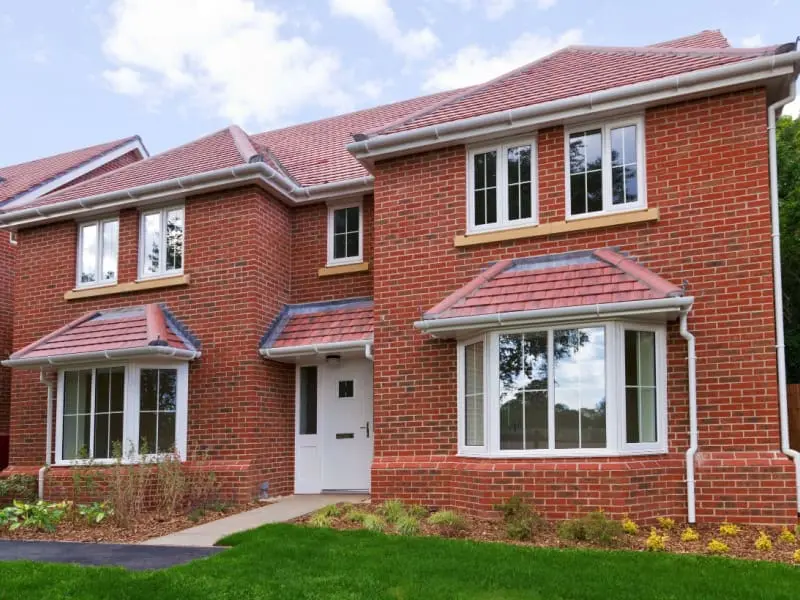
On this page, you will find helpful information to help you arrange unoccupied home insurance in the UK.
If you have questions not covered on this page, start a chat or contact us. You can click on any of the items in 'Contents' to jump to the section that interests you.
When insuring an unoccupied home with Insuristic, you can:
Tailor the cover to suit your requirements
Buy cover for most types of property
We have made it easy to get an unoccupied home insurance quotes, but if you need help, our team are only an online chat away.
You can learn more about the cover you can buy, property inspection rules and guidance on our renovation acceptance criteria below.
This page provides all the information you need when insuring an unoccupied home. The insurance policy you need is called Unoccupied Home Insurance.
You will find all the information you need in this video or on the page below. If you have any questions please start an online chat.
Unoccupied home insurance is a specialist insurance policy designed for circumstances when a property is going to be empty for more than 30 days.
The cover exists as standard home insurance providers view unoccupied property as higher risk. It is common for standard home insurers to:
Apply new policy conditions to reduce the risk of a claim whilst a property is empty.
Increase the premium; or
Decline to continue to cover the property.
The cover can also be more expensive than a standard home insurance product because empty homes are more likely to be damaged by damage (such as a burst pipe), fire, theft, or vandalism.
Not all policies are the same and cover can vary depending on the provider you approach. You might find this cover called different things online, such as empty home insurance or vacant home insurance.
Insuristic has developed two policies with different levels of cover so you can tailor the policy to meet your needs. I
People generally need to insurance an unoccupied home if:
The property is empty due to the owner's death. We have developed a specialist insurance policy for this, please visit our specialist probate house insurance page for more information or to get a quote.
You hold Power of Attorney, and the property owner has gone into care. You could insure the empty property on a short-term or long-term basis.
When a home is up for sale, and you have already moved into a new property.
When the property is empty during renovation, and you decide to live elsewhere until the work is complete.
Suppose you like holidays for over 30 days. In that case, you may need to consider home insurance for unoccupied property on a short-term basis if your existing insurer can't help you.
You are an executor on an empty property during the probate process and need to insure it.
You're a landlord with property between tenants, and your existing insurer is reluctant to insure the empty property.
You are often away on business and need insurance for your empty property when you are away for more than 30 days.
You've just purchased an investment property, which will remain empty until it's ready for sale or until tenants move in.
When insuring an unoccupied home, you need to know how it differs from standard home insurance.
It will differ in the following areas:
The unoccupied home will need to be inspected regularly (more on that later)
Insurers will recommend (some may insist) that you isolate and drain down water systems.
Insurers will also recommend (again, some may require) that you turn off the energy supply whilst the property is not in use.
The maximum sums insured for a single item of contents will often be restricted because items like art, jewellery, and electronic goods are attractive targets for theft. You should remove items like this from the property and store them securely.
You might also find that cover for contents in outbuildings, like garages or sheds, is restricted. Again, this is because items like lawnmowers, bikes, and tools are attractive for theft and potentially easy to steal when the main property is empty. Furthermore, you should remove valuable items from the property and store them securely.
You will usually be able to choose from different levels of cover. More on this later.
So far in 2024, the average Insuristic customer spent £265, including insurance premium tax, and purchased our silver cover for six months.
If you want to understand what factors influence the cost when insuring an unoccupied home, watch our video below or read on.
The cost of unoccupied home insurance will vary between providers. The price is determined by how long you need to insure the property and the level of cover you buy.
In addition to this, there are several other factors that will influence the price you pay:
The number of bedrooms in the property: The bigger the property, the higher the cost of repair or reinstatement. So insurers often factor the number of bedrooms in the property in their pricing.
The Property Rebuild Value: Some insurance products are priced at the cost of rebuilding the house, including professional and debris removal fees.
The Location of the Property: will affect the price you pay. For example, if the property is in an area known for flooding or subsidence or has a high crime rate, this will likely increase the cost.
Property Security: If your house is fitted with above-average levels of security, such as an alarm, this may result in some insurers providing a discount to reflect the lower risk of theft.
Property Maintenance: If the property is in good repair, well protected, regularly inspected, and all water pipes are insulated, the likelihood of a claim is reduced. If the house has been continuously claims-free, most insurers will offer a no-claims discount. The level of discount increases by the number of claims-free years.
The level of cover you buy: Unoccupied house insurance UK policies usually have three levels of cover. The cheapest is FLEEA-only cover. You can find out more about the levels of cover available from Insuristic above.
The only way to find out how much unoccupied home insurance costs is to get a quote online, which takes only a couple of minutes.
Suppose the property will be unoccupied for longer than your existing insurer allows, usually 30 continuous days (check your policy schedule for details). In that case, you must inform your insurer as soon as possible.
Because the risks are much higher for empty properties, many insurers either will not provide coverage or will restrict coverage for long periods of unoccupation.
The Financial Ombudsman Service has listed a number of case studies on its website that involve claims being rejected because the property was continuously unoccupied when the claim was made.
Here are some examples where the insurance provider has rejected claims because the property was unoccupied. The Financial Ombudsman Service ruled in favour of the insurance provider on both occasions:
Claims disputes can take time and are avoidable by purchasing a specialist unoccupied house insurance policy.
Don't leave it to chance if your house will be unoccupiedn for more than 30 continuous days. Notify your insurer to see if they can offer the cover.
If they don’t, you should purchase an unoccupied house insurance policy. You can usually buy this on a short-term basis.
Most people don’t know how long they need to insure an unoccupied property. Selling the property, finding new tenants, or completing renovations can take time.
Buying an annual policy might mean a more significant upfront expense than necessary, plus possible early cancellation fees.
Insuristic recognises this and has designed a process that makes arranging short-term unoccupied home insurance easy.
You can buy a policy for as little as three months, with options to insure for six or nine months.
However, the way our cancellation process works is that if you are willing to pay a minimum of three months' insurance premium, you can insure for less than three months.
This is because Insuristic:
Does not charge any fees to cancel a policy.
If you insure for longer than you need you will also receive a pro-rata refund for any unused cover.
Which means you only pay for the cover you need.
Why not get a quote if you need to arrange short-term unoccupied home insurance. It will only take a couple of minutes of your time.
Bronze is our basic level of cover. It only covers loss or damage to the buildings (or contents if you have chosen to insure that) caused by:
Fire
Lightening
Explosion
Earthquake; or
Aircraft
This cover is often referred to as FLEEA Insurance cover.
In addition, level 1 also includes:
Architects & surveyors fees and debris removal
Property owners liability insurance, covering your legal liabilities up to £2,000,000 should a member of the public be injured or have their property damaged at your premises.
There will be exclusions which can be found in your Insurance Product Information Document (IPID) or policy wording.
Silver is our mid-range level of cover. It extends to the FLEEA cover provided by Bronze to also include loss or damage to buildings (or contents if you have chosen to insure that) caused by:
Storm
Flood
Weight of snow
Impact of vehicles or animals
Falling trees, lamp-posts or telegraph poles
In addition it also provides cover for:
Accidental breakage of sanitary fittings
Accidental breakage to underground services which extend from your home to the public mains which you are legally liable for
The cost of finding the source of any leaks up to £1000 following an escape of water
Breakage or collapse of fixed radio or television aerials, satellite dishes & their masts
Increased domestic metered water charges up to £750 following an escape of water.
There will be exclusions which can be found in your Insurance Product Information Document (IPID) or policy wording.
Gold is our highest level of cover. It extends the cover provided in levels Bronze and Silver, to also include loss or damage to buildings (or contents if you have chosen to insure that) caused by:
Subsidence, heave or landslip (unless you live in an area prone to this type of damage. If this is the case and the cover is excluded, this will be shown clearly on your policy schedule).
Escape of Water or Oil to a maximum of £3,500 for any individual incident (to main this cover, you will need to keep the heating on at all times set to a constant temperature of 15 degrees)
Malicious Damage
Theft or Attempted Theft.
Exclusions will be found in your Insurance Product Information Document (IPID) or policy wording.
If you want to see at a glance what is or isn't covered, please view the IPID (Insurance Product Information Document). The policy wording contains the full terms and conditions of the insurance policy. There may be other exclusions and these will be listed on your schedule.
The Insuristic home insurance for unoccupied property scheme is underwritten by certain underwriters at Lloyd’s and administered by SJL Insurance Services.
Lloyds is the world's leading insurance marketplace, with an insurance premium income in excess of £35 billion.
SJL Insurance Services are a leading UK Insurance broker with offices in Worcester and Bristol.
If you need to make a claim on your unoccupied home insurance policy, don’t worry. The team at SJL Insurance Services are only a phone call away.
Between the hours of 9am and 5pm call 01905 27775. Outside of these hours call 0121 411 0535.
Check out our short guide on what is involved in making a claim.
Most people have never insured an unoccupied home before. It is not the same as standard home insurance.
Here are some common FAQs. If we missed anything, please start an online chat.
Don't worry, we have an inhouse claims team at SJL Insurance who can help you every step of the way.
Please visit our claims page to find contact phone numbers and to understand the process
The insurer will provide a pro-rata refund if you cancel the unoccupied policy.
Unlike many insurance brokers, we don't charge a cancellation fee.
To cancel, you need to provide the info on our contact us form, including a reason for cancellation, and we will do the rest.
If you are owed a a pro-rata refund for any unused cover, this will be send to the card you originally paid with.
There isn’t the option to pay monthly, but you can opt to buy a 3-month policy and renew it every three months. You will receive a renewal reminder at least 20 days before the cover expires. Renewing your policy via your online secure portal is easy, or you can contact us for assistance.
Alternatively, if you have various probate insurance policies to arrange and the estate doesn’t have the funds to pay for them, don’t worry.
Insuristic customers can arrange a probate insurance loan with our partner FSL Finance.
The loan is simple to arrange, with 90% of applications being accepted immediately.
There are no arrangement fees or early repayment charges.
Once a loan is approved, the money is paid to Insuristic to finance your insurance policies. You will then need to pay FSL Finance a monthly amount until the loan is repaid.
If you need cover before the loan is repaid, we can help you. Instructions of what to do in this scenario will be provided in your quotation.
You can find out more or to start on application on our Probate Loans page.
Our insurer deems carpets, other flooring, and blinds as fixtures of the building. Therefore, they should be included in the building sums insured. You do not need to include them as contents.
This will usually be found on the deeds of the document.
You can usually find an estimated build year on the property checker website if you do not have these.
Alternatively, check out our guide, 'How to find out when a house was built,' for more ways to determine the date of construction.
Your insurer will likely require you to keep the property at a set temperature (unless you have drained the water systems), usually to a minimum of 15°C. Be sure to check your policy wording for details.

Hi, I'm Rob, CEO and Founder of Insuristic. My mission is to make insurance easier to understand and buy online.
I hold an Advanced Diploma in Insurance (ACII) which demonstrates I have a solid technical understanding of Insurance and have committed to continuous professional development. I am also a member of the Chartered Insurance Institute and hold the a Chartered Insurance Broker status.
Over the last 27 years, I have worked for insurers, insurance brokers and insurance technology businesses, specialising in product, sales and marketing.
You can find out more about me on my author page or follow me on LinkedIn.

Insuristic Limited is an Appointed Representative of SJL (Worcester) Ltd, who are authorised and regulated by the Financial Conduct Authority with the reference number 763599. This can be checked by visiting https://register.fca.org.uk/s/.
Registered Office: Unit 2, 262 Walsall Road, Cannock, England, WS11 0JL. Registered in England and Wales No: 13926650.
Insuristic is a registered trademark. ©Copyright 2023 Insuristic Limited. All Rights Reserved.
Please Note: Our broking team at SJL Insurance will need to talk to you to discuss your requirements. This is an advised service.
Please Note: Our broking team at SJL Insurance will need to talk to you to discuss your requirements. This is an advised service.
Please Note: Our broking team at SJL Insurance will need to talk to you to discuss your requirements. This is an advised service.
Please Note: Our broking team at SJL Insurance will need to talk to you to discuss your requirements. This is an advised service.
Please Note: Our broking team at SJL Insurance will need to talk to you to discuss your requirements. This is an advised service.
Please Note: Our broking team at SJL Insurance will need to talk to you to discuss your requirements. This is an advised service.